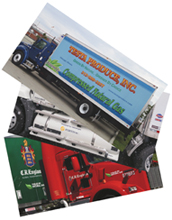Produce transporters are accelerating their efforts to tap new technologies that can save big money while balancing economic and environmental benefits. Among these cost-cutting measures are the use of alternative fuels, such as natural gas, and eliminating wind reduction through the use of truck platooning.
“Fleet operators are scrambling to get better fuel economy, not only to meet government standards, but to reduce their costs,” confirms Bob Wellens, vice president of sales for the Indianapolis, IN-based Auto Research Center, a design and testing facility specializing in aerodynamics. For some, this means a substantial investment into research and new technology now, to help reduce costs and raise profitability down the road.
PART ONE: NATURAL GAS
Fuel Alternatives and Beyond
Natural gas is becoming the alternative fuel of choice and is being adopted so quickly, it may not be seen as “alternative” much longer. While diesel prices rise and fall with the vicissitudes of the international oil industry, the supply of domestic natural gas has been increasing, along with the infrastructure needed to deliver it.
There are challenges to face, such as the expense of installing fueling stations and the cost differential of natural gas vehicles over diesel, but government and utility incentives are available in many locales, offsetting these costs and bringing payback for trucks within two or three years.
“We don’t think [natural gas] is ever going to replace diesel, but we think it is going to take a significant part of the market,” commented Zach England, chief operating officer of Salt Lake City, UT-based C.R. England, Inc., which has a growing fleet of natural gas-powered trucks.
Types of Alternative Fuel
Currently, there are two types of natural gas now used for truck fleets: compressed natural gas, or CNG, which is best for delivery routes and short hauls; and liquefied natural gas, or LNG, recommended for longer distances.
Other alternative fuels include biodiesel, vegetable oil- or animal fat-based diesel fuels, ultra low-sulfur diesel fuel, propane, bi-fuel or dual-fuel vehicles that use a combination of the products, and electric and hybrid electric cars and trucks.



